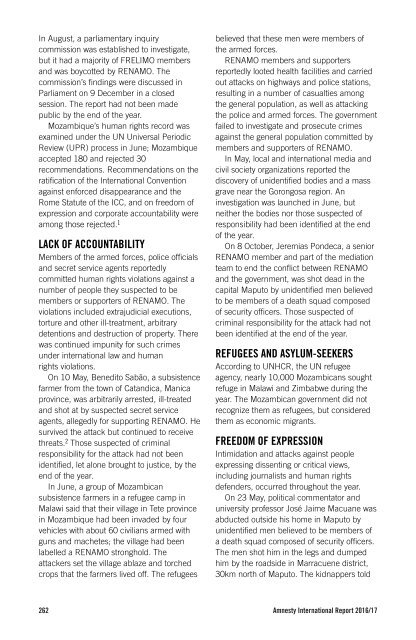AMNESTY INTERNATIONAL REPORT 2016/17
2lEHU9j
2lEHU9j
You also want an ePaper? Increase the reach of your titles
YUMPU automatically turns print PDFs into web optimized ePapers that Google loves.
In August, a parliamentary inquiry<br />
commission was established to investigate,<br />
but it had a majority of FRELIMO members<br />
and was boycotted by RENAMO. The<br />
commission’s findings were discussed in<br />
Parliament on 9 December in a closed<br />
session. The report had not been made<br />
public by the end of the year.<br />
Mozambique’s human rights record was<br />
examined under the UN Universal Periodic<br />
Review (UPR) process in June; Mozambique<br />
accepted 180 and rejected 30<br />
recommendations. Recommendations on the<br />
ratification of the International Convention<br />
against enforced disappearance and the<br />
Rome Statute of the ICC, and on freedom of<br />
expression and corporate accountability were<br />
among those rejected. 1<br />
LACK OF ACCOUNTABILITY<br />
Members of the armed forces, police officials<br />
and secret service agents reportedly<br />
committed human rights violations against a<br />
number of people they suspected to be<br />
members or supporters of RENAMO. The<br />
violations included extrajudicial executions,<br />
torture and other ill-treatment, arbitrary<br />
detentions and destruction of property. There<br />
was continued impunity for such crimes<br />
under international law and human<br />
rights violations.<br />
On 10 May, Benedito Sabão, a subsistence<br />
farmer from the town of Catandica, Manica<br />
province, was arbitrarily arrested, ill-treated<br />
and shot at by suspected secret service<br />
agents, allegedly for supporting RENAMO. He<br />
survived the attack but continued to receive<br />
threats. 2 Those suspected of criminal<br />
responsibility for the attack had not been<br />
identified, let alone brought to justice, by the<br />
end of the year.<br />
In June, a group of Mozambican<br />
subsistence farmers in a refugee camp in<br />
Malawi said that their village in Tete province<br />
in Mozambique had been invaded by four<br />
vehicles with about 60 civilians armed with<br />
guns and machetes; the village had been<br />
labelled a RENAMO stronghold. The<br />
attackers set the village ablaze and torched<br />
crops that the farmers lived off. The refugees<br />
believed that these men were members of<br />
the armed forces.<br />
RENAMO members and supporters<br />
reportedly looted health facilities and carried<br />
out attacks on highways and police stations,<br />
resulting in a number of casualties among<br />
the general population, as well as attacking<br />
the police and armed forces. The government<br />
failed to investigate and prosecute crimes<br />
against the general population committed by<br />
members and supporters of RENAMO.<br />
In May, local and international media and<br />
civil society organizations reported the<br />
discovery of unidentified bodies and a mass<br />
grave near the Gorongosa region. An<br />
investigation was launched in June, but<br />
neither the bodies nor those suspected of<br />
responsibility had been identified at the end<br />
of the year.<br />
On 8 October, Jeremias Pondeca, a senior<br />
RENAMO member and part of the mediation<br />
team to end the conflict between RENAMO<br />
and the government, was shot dead in the<br />
capital Maputo by unidentified men believed<br />
to be members of a death squad composed<br />
of security officers. Those suspected of<br />
criminal responsibility for the attack had not<br />
been identified at the end of the year.<br />
REFUGEES AND ASYLUM-SEEKERS<br />
According to UNHCR, the UN refugee<br />
agency, nearly 10,000 Mozambicans sought<br />
refuge in Malawi and Zimbabwe during the<br />
year. The Mozambican government did not<br />
recognize them as refugees, but considered<br />
them as economic migrants.<br />
FREEDOM OF EXPRESSION<br />
Intimidation and attacks against people<br />
expressing dissenting or critical views,<br />
including journalists and human rights<br />
defenders, occurred throughout the year.<br />
On 23 May, political commentator and<br />
university professor José Jaime Macuane was<br />
abducted outside his home in Maputo by<br />
unidentified men believed to be members of<br />
a death squad composed of security officers.<br />
The men shot him in the legs and dumped<br />
him by the roadside in Marracuene district,<br />
30km north of Maputo. The kidnappers told<br />
262 Amnesty International Report <strong>2016</strong>/<strong>17</strong>


